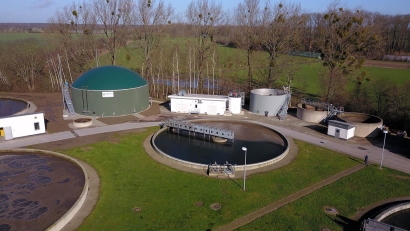
The range includes well-proven procedures from the field of biogas technology. The high savings potential of these procedures is demonstrated by the modernization of the municipal sewage treatment plant in Bückeburg, Germany, which caters to a population of 33,000.
Since the transition to anaerobic sludge stabilization by WELTEC BIOPOWER in 2021, the plant operation under full load has become much more profitable. As the general contractor, WELTEC was in charge of the setup of the wastewater treatment for the city‘s sewage treatment plant.
Apart from the earthworks, the establishment of the fundament and the electrical wiring, the work comprised the construction of a new static sludge thickener, an engine room for the cogeneration power plant, the control and pump station as well as a stainless-steel digester with a gas storage roof.
Thanks to the anaerobic wastewater treatment, the sludge volume has dropped by 35 percent, resulting in a significant reduction of transport and disposal costs. Furthermore, the produced digester gas can now generate some 465,000 kWh of electricity at full load.
The operator is thus able to cover about 40 percent of the power demand and save two thirds of the electricity costs.
"In view of the new greenhouse gas reduction targets and the surge in energy prices, an anaerobic stage is an economically attractive solution for wastewater treatment operations, which also benefits from public funding“, explains Jens Albartus, Director of WELTEC BIOPOWER.
He adds, "Ultimately, a combination of wastewater treatment, heat and power generation and climate protection enables more efficient operation, especially of small and medium-sized sewage treatment plants.“
A WELTEC plant in Piddlehinton, South West England, demonstrates how these goals can be reached with organic waste. Here, a mix of food leftovers, expired food from supermarkets and biowaste is fed into the biogas plant. Apart from the substrate mix, the technical approach, too, is special. Prior to the feed-in and shredding, an unpacking machine separates the food from the packaging.
Another efficiency bonus: The exhaust heat from the cogeneration power plant is sold to a nearby feed producer, which also uses most of the power. The biogas plant operator supplies the surplus electricity directly to the power grid, thereby generating further income.
The digestate from the process is in conformity with the requirements of UK industry standard PAS-100. Therefore, local farmers are able to use it as fertiliser. Following a capacity expansion in 2014 from 20,000 t of substrate input a year to 30,000 t, WELTEC BIOPOWER installed an additional digester and storage tank as well as GasMix mixing systems and a separation unit. A plant with these features would also support a switch to biomethane production.
At the IFAT trade show in Munich (A4.217), the WELTEC experts will be pleased to provide further information on various treatment and biogas technologies.
PHOTO: As the general contractor, WELTEC was in charge of the setup of the wastewater treatment for the Bückeburg sewage treatment plant. Apart from the earthworks, the establishment of the fundament and the electrical wiring, the work comprised the construction of a new static sludge thickener, an engine room for the cogeneration power plant, the control and pump station as well as a stainless-steel digester with a gas storage roof.

